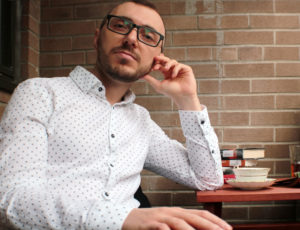
FOR 2603 2017 – 2023
The DFG Center for Advanced Studies “Russian-Language Poetry in Transition” (FOR 2603) cordially invites you to a lecture with Oleksandr Averbuch streamed live via Zoom. Please register by e-mail with Anna Fees (anna.fees@uni-trier.de) no later than May 3rd, 2022, to receive the stream’s access data.
Oleksandr Averbuch will read poetry from his recent book, which deals with interwoven Jewish/Ukrainian relations through the prism of his family’s history and Ukraine’s multiethnic past and present. The book’s central cycle features poeticized documentary materials related to the Second World War: letters by Ukrainian Ostarbeiter sent to their relatives in Ukraine, interwoven with letters by Jewish Holocaust survivors who returned to devastated villages in Ukraine in search of their murdered relatives. The last cycle deals with the Russo-Ukrainian war currently taking place in Averbuch’s home region of Luhans’k, where he was born in the village of Novoaidar. The readings will be given in the original Ukrainian followed by questions and answers with the author (in English or Ukrainian).
Oleksandr (Alex) Averbuch, a native of Novoaidar, Luhans’k region, Ukraine (b. 1985), is a literary historian, bilingual (Ukrainian/Russian) poet, and translator. He is the author of three books of poetry and an array of literary translations between Hebrew, Russian, Ukrainian, and English. His poetry deals with the issues of ethnic fragmentation and in-betweenness, multiple identities, queerness, cross- and multilingualism, documentalist writing, and memory. He has also organized numerous literary performances and festivals. He specializes in Russian, Ukrainian, and Hebrew literatures; commodity culture; gender and critical race theory; the European Enlightenment; transnational cultures; translation; and using creative writing in foreign language pedagogy. He earned his PhD in Slavic and Jewish studies at the University of Toronto with a dissertation on the history of the genre of solicitory poetry in Russian, Ukrainian, and Hebrew. Currently he is the Izaak Walton Killam Memorial Postdoctoral fellow at the University of Alberta.
